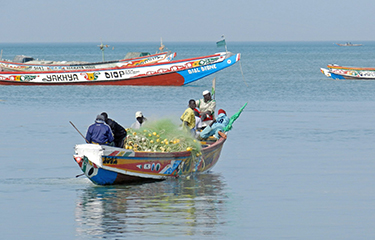Senegal has partnered with a group of fishing industry private players to launch the pole-and-line tuna fishery improvement project (FIP) nearly two years after a memorandum of understanding was signed for its implementation, in an effort to support the West African country’s fisheries sector to achieve Marine Stewardship Council (MSC) certification.
The new FIP – which has brought together the Senegalese government, WWF-UK, Thai Union Group PCL, Princes Limited, Asociación Atuneros Cañeros DAKAR TUNA, SENEMER Fishing Industries, and TUNASEN – will focus on key fishery aspects of “healthy fish stocks, minimizing and mitigating impact on ecosystems, and effective management of fisheries and ensure adoption of best fishing industry practices,” according to Princes Limited.
“The new FIP will cover individual, pole and line catches of skipjack, yellowfin and bigeye tuna and their bait stock,” added the company in a statement on 5 August. “Participants will also work closely with the fishing authorities of Senegal to improve the governance of fisheries in the region."
The project will be coordinated by Youssef Jaridi, who assumed the new leadership role on 15 July. Jaridi will work together with WWF-UK to ensure “fishery managers use MSC-developed tools to identify and track areas for improvement for the fishery to meet the MSC Fisheries standard.”
The voluntary standard is based on the United Nations Food and Agriculture Organization Code of Conduct for Responsible Fisheries, which provides the main guidelines for sustainable fishing, minimizing environmental impact, and ensuring effective management.
MSC said it had enabled the certification of 18 tuna fisheries by March 2018, with another nine in the assessment phase.
MSC uses its blue eco-label to identify seafood that has come from sustainable fisheries certified to this standard.
“The world’s fisheries are under more pressure than ever before, but we can find solutions if the seafood industry works together with authorities and NGOs,” said Clarus Chu, seafood manager for WWF-UK. “The establishment of the Senegal pole and line FIP shows leadership and initiative from producers and vessel owners in the Senegal pole and line tuna fishery."
She added that the Senegal FIP “must be used to develop stock, ecosystem and management improvements that create a sustainable future for tuna in the region.”
The launch of the Senegalese FIP comes at a time when overfishing, which has affected 50 percent of fish stocks in Western Africa, has “greatly diminished the fish stocks in Senegal,” according to a USAID report.
“This trend is similar to the state of global fisheries where more than 30 percent of assessed fish stocks are overexploited and another 60 percent are harvested at their maximum sustainable yield,” said USAID. “The decline of this resource threatens the economic livelihoods and food security of millions of people in Senegal and surrounding countries."
With an estimated 80 percent of the country’s reported catch attributed to artisanal fishing and an estimated 60 percent of all fish caught, the report estimates Senegal’s industrial illegal, unreported, and unregulated fishing between 1999 to 2011 reached 2.6 million tons, worth USD 300 million (EUR 267 million) per year.
“The launch of the Senegal FIP is an important component in reaching our responsible sourcing targets and builds on our experience from developing and progressing the larger Indian Ocean FIP with our partners over the last couple of years,” said David McDiarmid, the corporate relations director at Princes Limited.
A number of consumers are keen on looking for and choosing seafood with certified labels such as the MSC eco-label, McDiarmid said. As a result, the new FIP in Senegal is being seen as a major boost to efforts aimed at safeguarding the country’s ocean resources.
“By supporting FIPs, we aim to help conserve marine ecosystems and protect the livelihoods of the millions of people who depend on them,” said Tony Lazazzara, the group fisheries sustainability and European fish procurement director for Thai Union. “We have made significant progress against Thai Union’s ambitious global tuna commitment, and the new Senegal FIP further reinforces our commitment to sustainable tuna."
Image courtesy of USAID/COMFISH







